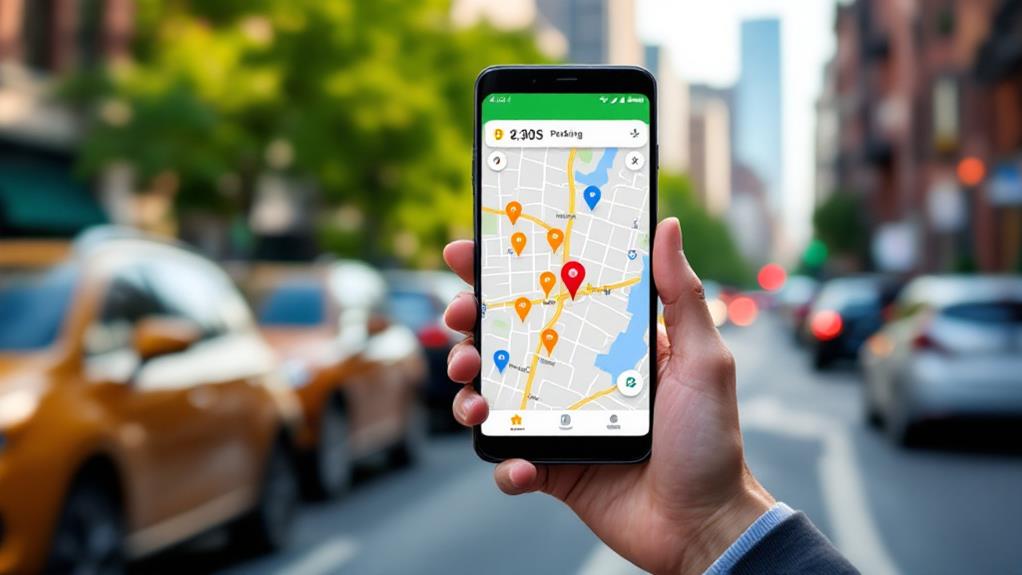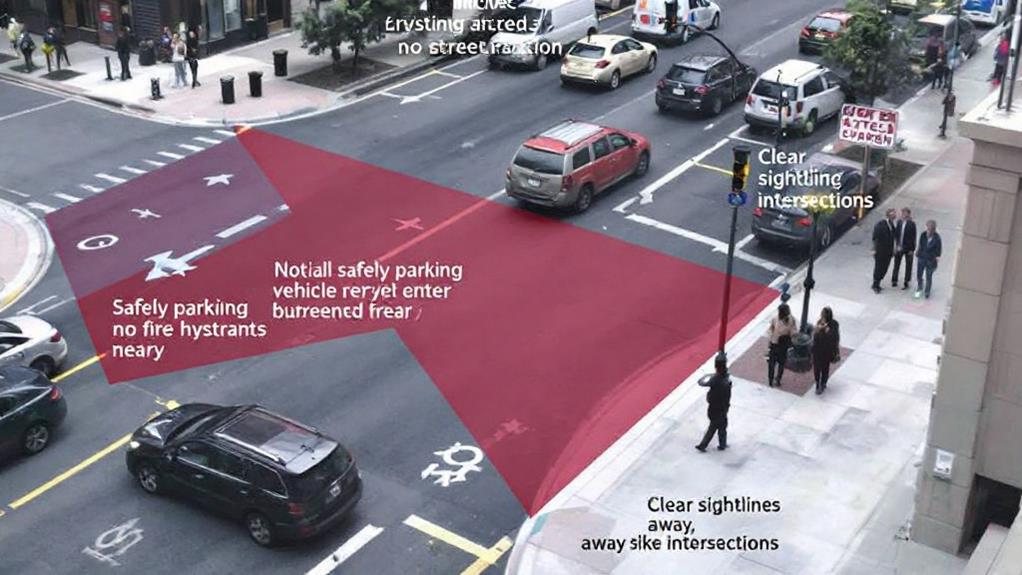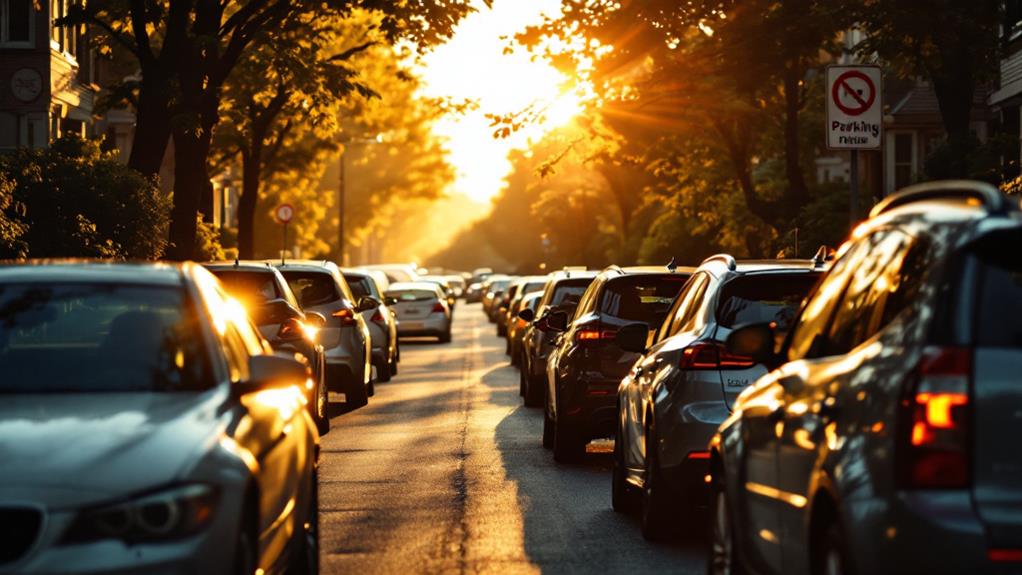Street Parking Rules You Need to Know in Major Cities
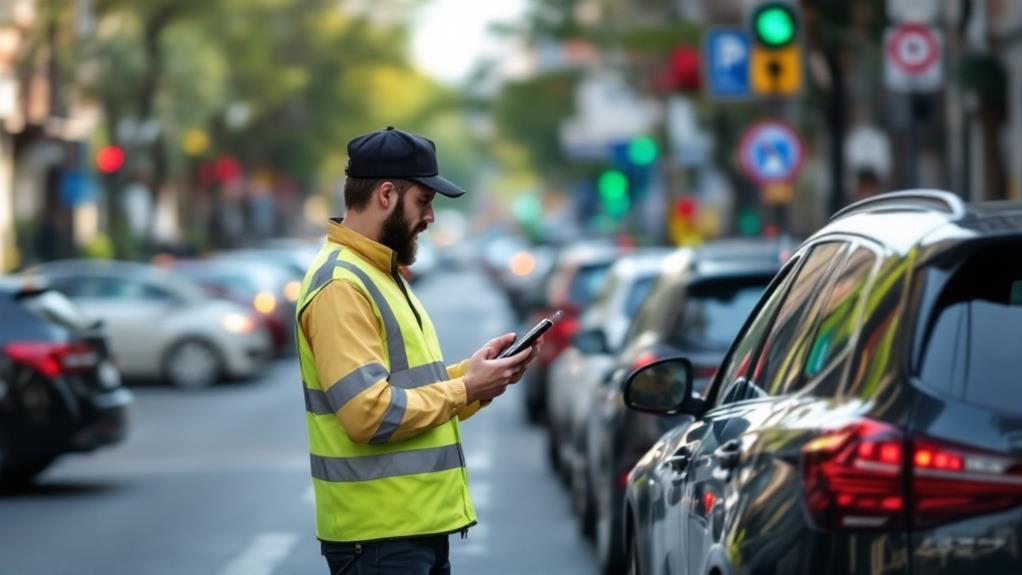
When parking on city streets, you'll need to follow several key rules. Don't park within 20 feet of driveways or intersections, and stay 15 feet away from fire hydrants. Pay attention to metered parking and time limits, which typically range from 1 to 4 hours. In residential areas, you may need a permit to park. Be aware of street cleaning schedules to avoid tickets. Never park in bike lanes or block bus stops. Remember to check for loading zones and commercial vehicle restrictions. Understanding these regulations will help you maneuver urban parking with confidence and avoid costly mistakes.
Distance From Driveways and Intersections
When parking on city streets, you've got to mind your distance from driveways and intersections. In Texas, the Transportation Code sets specific rules to guarantee public safety and traffic flow. For example, you can't park your vehicle within 20 feet of a driveway entrance. This regulation helps maintain clear sightlines for drivers exiting driveways and reduces the risk of accidents.
Intersections require even more attention. You're not allowed to park within an intersection itself, as this can obstruct traffic and create dangerous situations. Additionally, Texas law prohibits parking within 20 feet of a crosswalk at an intersection. This rule applies to both marked and unmarked crosswalks, safeguarding pedestrian safety and visibility.
While these regulations are specific to Texas, many major cities have similar parking rules. In Houston and other urban areas, you'll need to be particularly aware of these restrictions due to higher traffic volumes. Remember, parking too close to stop signs, intersections, or driveways can result in citations or towing. Always check local parking regulations and look for posted signs before leaving your vehicle. By following these guidelines, you'll help keep city streets safer and more accessible for everyone.
Fire Hydrants and Emergency Access
A crucial aspect of street parking rules involves fire hydrants and emergency access. You'll need to be vigilant about where you park to avoid hefty fines and potential towing. Remember, parking within 15 feet of a fire hydrant is strictly prohibited. This rule isn't just a bureaucratic inconvenience; it's essential for ensuring that fire departments have unobstructed access to water sources during emergencies.
Cities take these parking restrictions seriously, enforcing them rigorously to maintain clear paths for emergency equipment. It's not just about fire hydrants, though. You should also be aware of other emergency access rules:
- Don't park within 20 feet of a crosswalk to guarantee pedestrian safety
- Keep at least 30 feet away from stop signs for better visibility
- Avoid blocking driveways or intersections, which can impede emergency vehicle access
These rules are in place to prevent safety hazards and guarantee swift response times during emergencies. Municipal enforcement is strict, and violators may face tickets or towing. By following these guidelines, you're not just avoiding fines; you're contributing to the overall safety of your community. Always be mindful of your surroundings and look for signs indicating parking restrictions before leaving your vehicle.
Metered Parking and Time Limits
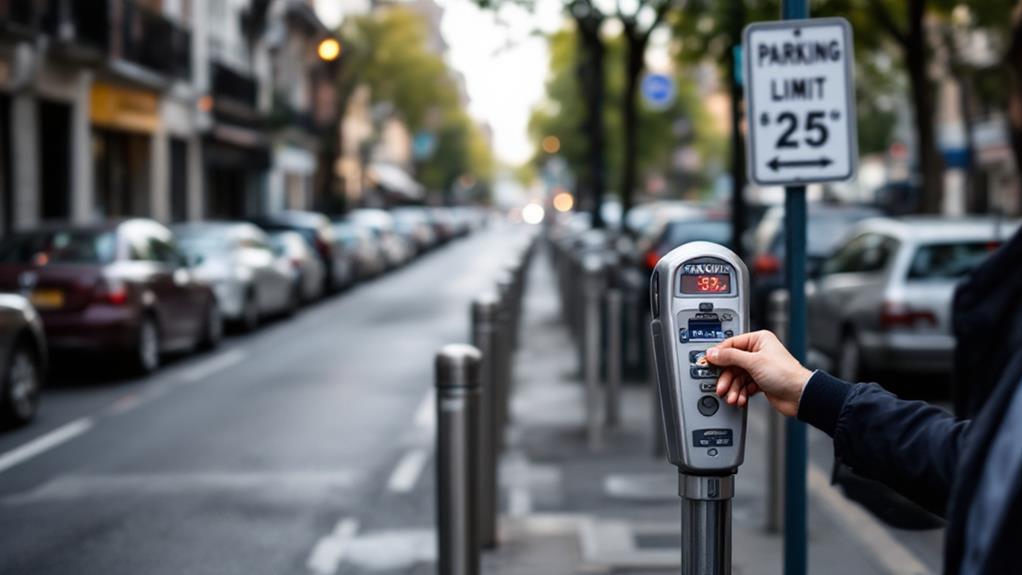
Maneuvering metered parking and time constraints is an indispensable skill for urban drivers. You'll encounter metered parking in most major cities, requiring payment through mobile apps or at pay stations. Time limits typically range from 1 to 4 hours, and strict enforcement means you'll risk a citation if you overstay your welcome.
Be aware that meters and time limits are active during posted hours, which vary by location. While some cities offer free parking on weekends or holidays, others maintain metered parking seven days a week. To avoid fines, always check the signs and pay attention to the rules in your specific area.
When using metered parking, make sure you have the necessary payment methods ready. Many cities now offer mobile apps for convenient payment and time extensions. However, don't assume you can indefinitely extend your time – maximum limits still apply. If you exceed the allotted time or fail to pay, you may receive a citation. These fines can increase if left unpaid, so it's essential to address them promptly. By understanding and following metered parking rules, you'll save yourself time, money, and frustration while navigating city streets.
Residential Permit Zones
Traversing residential permit zones adds another layer of complexity to urban parking. These zones are established in high-demand areas to prioritize parking for residents. If you're visiting or living in a city with permit zones, you'll need to be aware of the rules to avoid costly citations or towing.
- Residents within the zone can obtain permits for a fee, allowing them to park on the street during posted enforcement hours.
- Visitors may need to acquire temporary passes or guest permits to park legally.
- Vehicles without proper permits are subject to citations or towing during enforced hours.
When parking in a residential permit zone, always check for signs indicating the zone's boundaries and enforcement hours. If you're a resident, apply for a permit through your local parking authority. As a visitor, look for guest parking options or seek temporary passes. Remember, these zones are designed to manage parking demand in busy urban areas, so respecting the rules is vital. By understanding and following permit zone regulations, you'll avoid parking headaches and contribute to smoother traffic flow in residential neighborhoods.
Street Cleaning Schedules
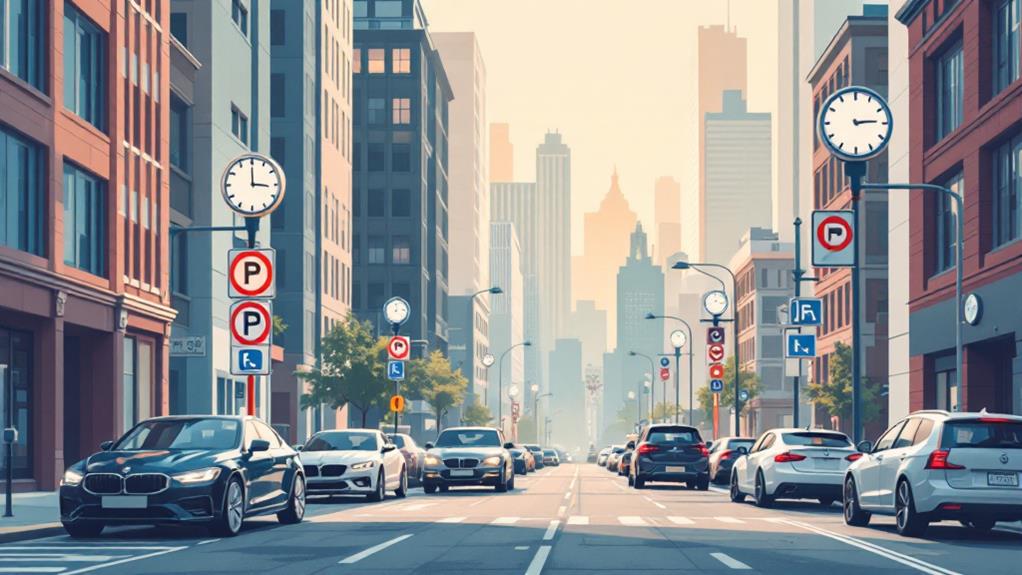
In addition to permit zones, street cleaning schedules pose another challenge for urban parkers. Many cities require you to move your vehicle on specific days to allow for street sweeping, and failure to comply can result in parking citations.
If you're in Houston, you'll need to be aware of the neighborhood-specific street sweeping schedules, which can occur weekly or monthly. Look for posted signs indicating the designated days to avoid tickets. In Los Angeles, street cleaning takes place on set days and times, with signs displaying the prohibited parking hours. You'll need to relocate your vehicle during these periods to guarantee a clean sweep.
Chicago follows a ward-based schedule for street cleaning, so you'll need to know which ward you're in and the corresponding cleaning days. Seattle employs a rotating schedule, requiring you to check online resources or posted signs regularly to stay informed about upcoming street sweeping in your area.
To avoid parking citations and contribute to cleaner streets, make sure you're familiar with your city's street cleaning schedule. Set prompts, pay attention to posted signs, and be prepared to relocate your vehicle as needed.
Loading Zones and Commercial Vehicles
Commercial vehicle loading zones present unique challenges for urban parking. These designated areas are specifically for commercial vehicles with company logos to load and unload goods. If you're driving a commercial vehicle, you can legally park in these zones, but be aware of strict time limits to guarantee turnover and availability for other businesses.
To avoid citations when using loading zones, keep these key points in mind:
- Your vehicle must have proper markings, such as a company logo.
- You must be actively loading or unloading goods.
- Adhere to posted time limits, which are often strictly enforced.
Passenger vehicles are generally prohibited from parking in these zones. If you're not driving a commercial vehicle, it's best to steer clear of loading zones to avoid potential fines. Enforcement of these rules is typically rigorous to maintain the intended purpose of these areas.
Remember that loading zones are essential for efficient urban logistics. By following the rules and respecting these designated spaces, you'll contribute to smoother operations for businesses and avoid unnecessary citations. Always check for signage and be mindful of your surroundings when parking in busy city areas.
Bike Lanes and Bus Stops
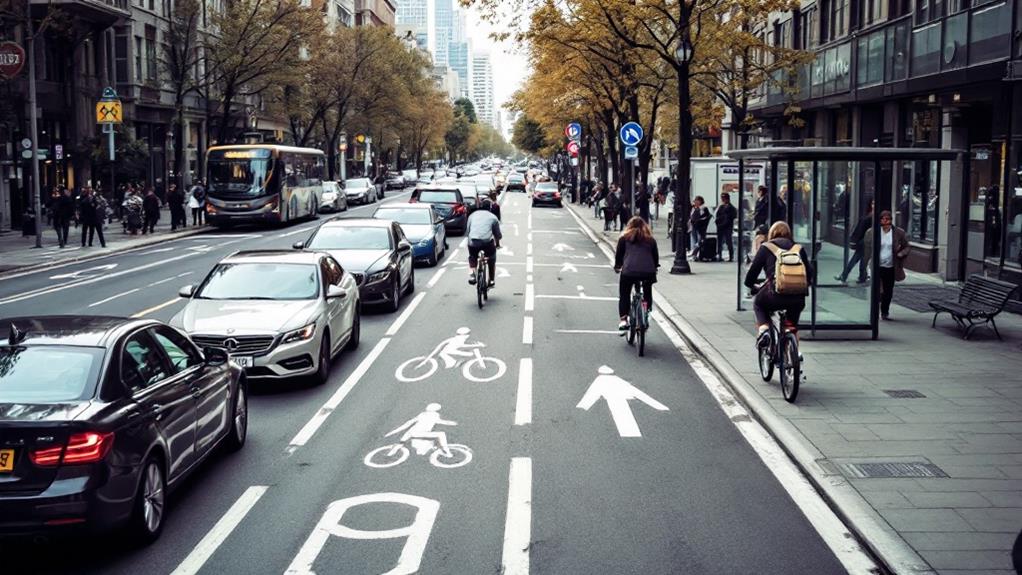
When it comes to bike lanes and bus stops, you'll need to exercise extra caution while parking in urban areas. City streets often feature dedicated bike lanes for cyclists' exclusive use, and it's paramount that you never park your vehicle in these areas. Doing so not only creates a dangerous obstruction for cyclists but can also result in hefty fines and potential towing of your car.
Similarly, you must be mindful of bus stops when looking for parking spots. Vehicles parked within 30 feet of a bus stop can impede public transportation by preventing buses from safely loading and unloading passengers. To avoid disrupting bus services and risking penalties, always maintain a safe distance from bus stops when parking.
To confirm you're not inadvertently blocking bike lanes or bus stops, familiarize yourself with local parking regulations. These rules can vary between cities, so it's indispensable to stay informed about specific restrictions in your area. By respecting designated spaces for cyclists and public transportation, you'll contribute to smoother traffic flow and safer city streets while avoiding costly fines and the inconvenience of having your vehicle towed.
Overnight Parking Restrictions
Despite the convenience of street parking, many urban areas impose strict overnight parking restrictions. These municipal regulations typically prohibit parking on residential streets during late-night hours, usually between 2 AM and 6 AM. The purpose is to maintain access for emergency vehicles and uphold safety in urban areas.
If you're planning to park overnight, be aware of these important points:
- Check for signs indicating parking restrictions in your area
- Obtain necessary parking permits if you're a resident or guest
- Move your vehicle before the restricted hours begin to avoid penalties
Failure to comply with overnight parking rules can result in costly consequences. You may receive parking tickets, have your vehicle towed, or face steep fines and impound fees. Some cities offer exceptions or special parking permits for residents, guests, or certain vehicle types in designated parking zones.
To avoid issues, familiarize yourself with local parking regulations before leaving your car overnight. Many cities provide online resources or mobile apps to help you maneuver parking restrictions. By staying informed and following the rules, you'll save yourself from unnecessary headaches and expenses related to overnight parking violations.
Accessible Parking Regulations
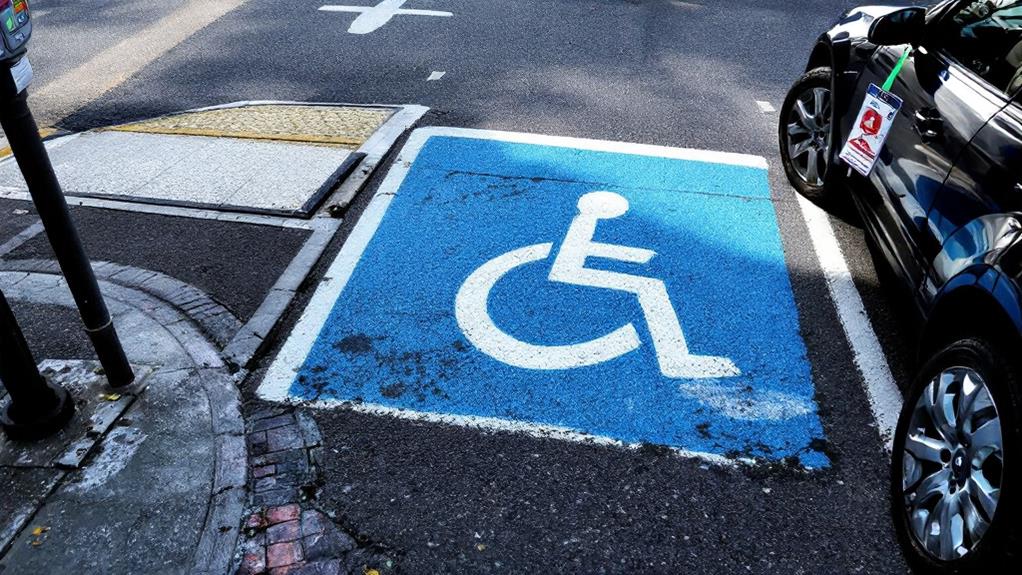
While overnight parking restrictions apply to most drivers, cities also have specific regulations for accessible parking. If you have a disability that qualifies you for an accessible parking permit, you're allowed to park in designated accessible parking spaces. These spots are marked with the wheelchair symbol and are typically wider to accommodate mobility devices and ramps.
To use these spaces, you must display a valid disabled placard or license plate. It's essential to use your accessible parking permit responsibly, as misuse can result in hefty fines and penalties. These fines can be as high as $500 in some cities, depending on local regulations.
Parking enforcement officers and local law enforcement actively monitor accessible parking spaces to guarantee they're available for those who need them. If you don't have proper credentials, avoid parking in these spots, even for a short time. Remember, using these spaces without authorization deprives those with disabilities of the parking they require.
Cities take accessible parking regulations seriously to maintain equal access for all residents and visitors. Always respect these rules to avoid fines and support your community's accessibility needs.
Mobile Payment Options
Mobile apps have revolutionized street parking payments in major cities. You can now use convenient options like ParkHouston, ParkMobile, and Google Pay to pay for your parking spot. These apps offer several advantages over traditional parking meters, including the ability to receive alerts before your session expires and add more time remotely to avoid citations.
When using mobile apps for parking, keep these important tips in mind:
- Enter your license plate number correctly, using the number 0 instead of the letter O and avoiding special characters or spaces.
- Select the appropriate vehicle in the app to facilitate a smooth parking transaction.
- Pay attention to the specific parking zone or location you're in to avoid any mistakes.
If you prefer not to use mobile apps, you can still pay by text or credit card at the parking meter. Remember, whether you're parking at a curb or in a city parking lot, you must pay either through the app or at the meter. Never pay an attendant directly. By following these guidelines and utilizing mobile payment options, you'll find street parking in major cities much more convenient and hassle-free.
